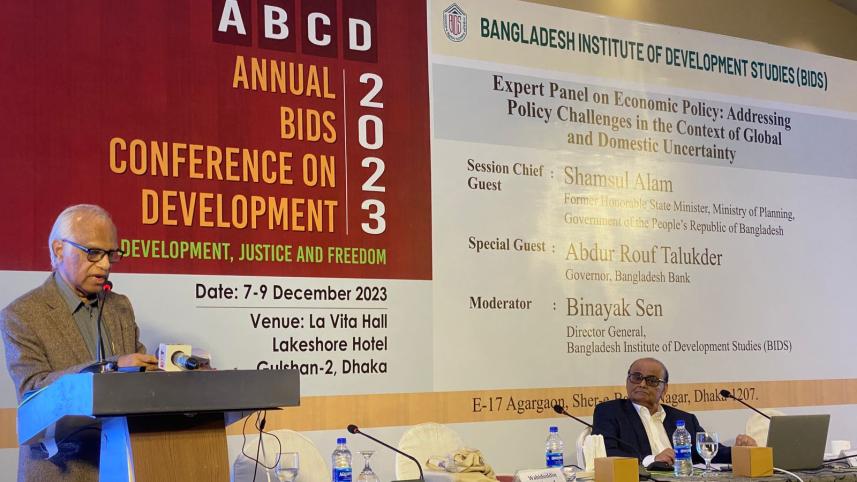Landowners who solely depend on farming face tough times

Households whose income for subsistence comes only from farming, including leasing out cropland, are now going through tough times, according to researchers.
"Land-owning families meet capital needs via leasing out and mortgaging land," said MA Sattar Mandal, professorial fellow of the Bangladesh Institute of Development Studies (BIDS).
With no non-farm or remittance income, this has translated to restricted occupational mobility, he said.
He was addressing a session on "Agrarian change in contemporary Bangladesh" on the concluding day of an Annual BIDS Conference on Development (ABCD) 2023 organised by the BIDS at Lakeshore Hotel in Dhaka yesterday.
Leasing out land for long periods while not being there in person can lead to the rise of threats to the land ownership, said Mandal, also a professor emeritus of Bangladesh Agricultural University.
Younger generations of farmers love off-farm jobs and do not want to engage in crop cultivation and this is nowadays leading to severe shortages of labour in rural areas during peak farming seasons, he said.
While commercial farms are shifting to mechanisation, their use of chemicals and pesticides has increased, he added.
Though machines are increasingly being used in farming, the labour shortage still puts pressure on elderly male farmers, said Mandal.
The older generation is in a dilemma as they are happy to see their children free from arduous farming jobs but they themselves are being left behind to care for the family through cultivation amid uncertainties over the supply of labour.
Now, feminisation in cultivation is increasing and schoolchildren also helping their male counterparts, he added.
In another presentation on "Choice of tenancy in rural Bangladesh: Evidence from BIDS-BARD micro survey", Binayak Sen, director general of the BIDS, said owner-operated and owner-managed farming should become more profitable in course of the modernisation of agriculture.
The increase in the share of cultivable area under tenancy and the unpredictable rise of landless tenants have been brought about by a confluence of several factors that underpin rural structural transformations in Bangladesh, he said.
However, the spread of education, expansion of regular jobs, and urbanisation (domestic migration) have encouraged land-rich households to lease out agricultural lands.
According to neo-classical views, owner-operated and owner-managed farming is more efficient than tenant-operated farming because sharecroppers usually give less work effort to farming, said Sen.
This moral hazard of imperfect monitoring leads to sharecroppers failing to obtain the full benefit of their inputs.
Farming by the landowners is likely to be more profitable than sharecropping, with classical literature portraying landless tenants as a vanishing tribe compared to the owner-cum-tenants, he said.
As supervision and monitoring costs on the part of the landowners have gone up, so has their preference for contract farming through short-term contracts, Sen added.
According to him, Bangladesh has silently transitioned from inefficient sharecropping to this more efficient fixed rental system.
Sen also said the supply of agricultural land in the tenancy market can increase due to the rising importance of non-agricultural incomes for agricultural land owners.
Landless tenant households are no longer constrained by the lack of complementary non-land inputs as there has been a rapid expansion of farm mechanisation markets that support agricultural operations.
These labour-saving techniques help landless tenants reduce the cost of hiring labour in the face of peak seasons of labour shortages.
This also suggests that some landless households will specialise in self-employment via the route of tenancy, he added.
According to Sen, the share of rented land in total cultivated land was only 23.4 percent in rural Bangladesh in 1988.
It increased to 32.9 percent in 2000 and 39.8 percent in 2008 and by 2014, it had increased further to 45 percent, he said.
Speaking at the session, Hossain Zillur Rahman, executive chairman of the Power and Participation Research Centre, suggested focusing on climate change resilience in agriculture to ensure proper use of land.
According to him, rural infrastructure development is more profitable than that for urban areas due to higher and rapid output of the agriculture sector as well as associated poverty reduction, he said.
There are good opportunities for countryside investments in Bangladesh, particularly in the agriculture sector, he added.
The session was chaired by Geof Wood, professor emeritus of the Department of Social and Policy Sciences at the University of Bath.
Wahiduddin Mahmud, an economist, Quazi Shahabuddin, former director general of the BIDS, Mohammad Golam Nabi Mozumder, research fellow, and Shishir Kumar Munshi, director of the Bangladesh Academy for Rural Development, also spoke.



 For all latest news, follow The Daily Star's Google News channel.
For all latest news, follow The Daily Star's Google News channel.
Comments